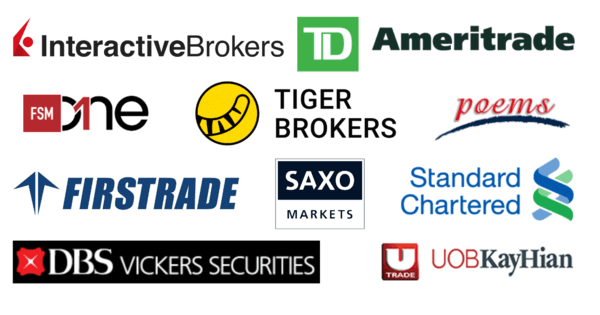Advertisement
OPINIONS
How To Choose a Broker (for Singaporeans)
DIY investing can be shockingly expensive if you are not careful
Nicholas Beh
09 Jan 2021
Student Ambassador 2020/21 at Seedly
It is no surprise that questions about stock brokerages are often one of the most frequently asked on Seedly Community. If you are new to investing, signing up and making your first trade with a brokerage can be a rather intimidating process. After all, it is your own money at stake, and we want the best deal our money can get.
In this article, we will be going through the various considerations you will need to take into account when it comes to selecting a broker. This is not a comparison article! After reading this article, you will be equipped with the knowledge to properly compare and decide which broker(s) is best for you. However, I will be including some of my personal experiences with the various brokers I have used so far.
Market Access
The most important consideration when it comes to a broker is the markets that a broker can access. If your broker can’t access the markets you want to invest in, that you are just wasting your time. For most Singaporeans, access to the following markets are sufficient:
US – the world’s biggest stock market
Hong Kong – for exposure to China
UK – for Irish domiciled ETFs
Singapore – local exposure
Some may say that access to US markets is sufficient, given that there are a wide variety of ETFs that track different sectors and geographical regions. However, US-domiciled ETFs are subject to the following taxes:
Withholding tax levied by the country where the underlying security is domiciled in (e.g. 10% for China)
US withholding tax (30%)
US estate tax (18-40%)
For example, if you want to invest in an ETF that tracks the MSCI China index, dividends for MCHI.US would be taxed at a rate of 37% (10% China, 30% US), while 2801.HK will only be taxed at a rate of 10% only because Hong Kong does not levy withholding taxes on dividends.
For US estate taxes (as a US nonresident alien), if you pass away, your estate is liable to pay estate taxes on US situs assets in excess of 60,000 USD. The tax rate ranges from 18% to 40% which is certainly not an insignificant amount. Investing through Irish-domiciled ETFs can shield you from such liability. Do consult a tax advisor if you are unsure.
Recurring fees

Congratulations on your dividend entitlement of 0.00 USD! (Source: reddit)
Before we even consider transactional fees such as commissions, we need to talk about recurring fees. Recurring fees are fees that may incur for as long as you hold any kind of holdings with the broker, even if you do not perform any trades. They include, but are not limited to:
Custody fees
Dividend handling fees
Corporate action fees
Account maintenance fees
Monthly minimum commission
In any case, you would want to avoid these fees at all costs. Local brokers are notorious for charging these fees - check the fee schedule carefully! Most brokers with competitive offerings have already gotten rid of all these fees, such as Firstrade, Standard Chartered, TD Ameritrade and Tiger.
Transactional fees
Lastly, we have transactional fees, which are fees that occur whenever you perform an action such as buying, selling or withdrawing. Some of these fees include:
Commissions
Currency conversion fee/forex spread
Withdrawal fees
Transfer fees
Commissions are particularly important, especially if you are a small investor. Higher commissions means less of your capital is being invested into the markets! Take note of the percentage charge, but be equally aware of the minimum commission as well.
Currency conversion fees and forex spreads are often overlooked by most investors. If you are not careful, there are some brokers that can charge you up to 0.75% each time you convert currency! Furthermore, you will eventually need to convert back your currency, incurring the fee/spread once again.
Withdrawal and transfer fees are of lower significance, but can result in unnecessary expense. Some brokers charge a fee for withdrawals to bank accounts, which you should consider when transferring money to and from your account. As for transfer fees, brokers may charge you a fee to simply transfer your holdings to another broker resulting in high switching costs.
Brokers I use
Although this is not a comparison article, I feel that it is useful to include the various brokers that I use, since I have already done my research to determine which options are best for me. Personally, I use:
DBS Vickers Cash Upfront (to buy and hold SG stock in CDP)
FSMOne (to sell SG stock from CDP)
Interactive Brokers (for Irish-domiciled ETFs)
TD Ameritrade (for US markets)
Tiger Brokers (for small SGX trades and itchy fingers)
Some things to note though:
I love the interface and user experience of Tiger Brokers. Unfortunately I perform most of my trades on other platforms due to cost.
Interactive Brokers charges 10 USD monthly minimum commission if your account value is below 100k USD. I am below 25, so it is a relatively low 3 USD for now.
It took almost 10 weeks and 4 phone calls to open my TD Ameritrade account.
Now, with this knowledge, you can better determine which broker will suit you best! If you are still unsure, many brokers offer paper trading as a way for you to test drive their platform before you commit to opening and funding your account. Having multiple brokerage accounts is perfectly fine as well... as long as they don't charge you fees! Feel free to leave a comment below if you have any questions!
Comments
3978
1
ABOUT ME
Nicholas Beh
09 Jan 2021
Student Ambassador 2020/21 at Seedly
I like money
3978
1
Advertisement
No comments yet.
Be the first to share your thoughts!
